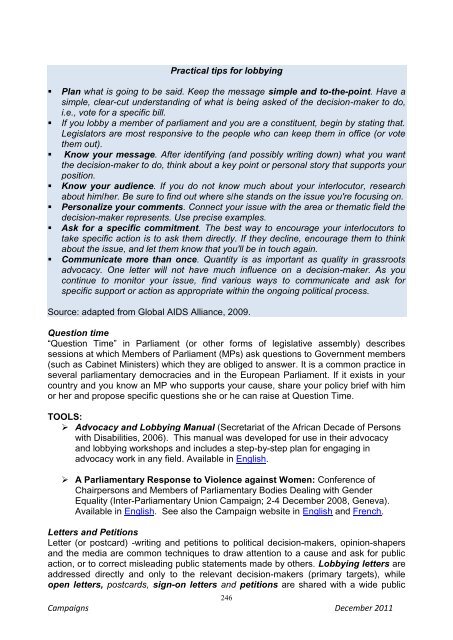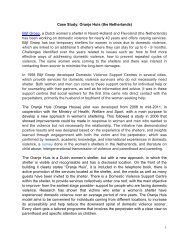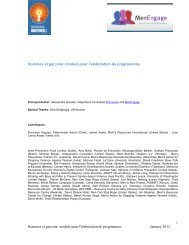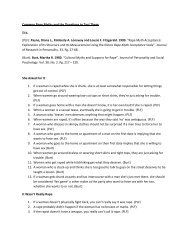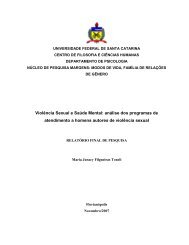Campaigns to End Violence against Women and Girls - Virtual ...
Campaigns to End Violence against Women and Girls - Virtual ...
Campaigns to End Violence against Women and Girls - Virtual ...
Create successful ePaper yourself
Turn your PDF publications into a flip-book with our unique Google optimized e-Paper software.
Practical tips for lobbying<br />
� Plan what is going <strong>to</strong> be said. Keep the message simple <strong>and</strong> <strong>to</strong>-the-point. Have a<br />
simple, clear-cut underst<strong>and</strong>ing of what is being asked of the decision-maker <strong>to</strong> do,<br />
i.e., vote for a specific bill.<br />
� If you lobby a member of parliament <strong>and</strong> you are a constituent, begin by stating that.<br />
Legisla<strong>to</strong>rs are most responsive <strong>to</strong> the people who can keep them in office (or vote<br />
them out).<br />
� Know your message. After identifying (<strong>and</strong> possibly writing down) what you want<br />
the decision-maker <strong>to</strong> do, think about a key point or personal s<strong>to</strong>ry that supports your<br />
position.<br />
� Know your audience. If you do not know much about your interlocu<strong>to</strong>r, research<br />
about him/her. Be sure <strong>to</strong> find out where s/he st<strong>and</strong>s on the issue you're focusing on.<br />
� Personalize your comments. Connect your issue with the area or thematic field the<br />
decision-maker represents. Use precise examples.<br />
� Ask for a specific commitment. The best way <strong>to</strong> encourage your interlocu<strong>to</strong>rs <strong>to</strong><br />
take specific action is <strong>to</strong> ask them directly. If they decline, encourage them <strong>to</strong> think<br />
about the issue, <strong>and</strong> let them know that you'll be in <strong>to</strong>uch again.<br />
� Communicate more than once. Quantity is as important as quality in grassroots<br />
advocacy. One letter will not have much influence on a decision-maker. As you<br />
continue <strong>to</strong> moni<strong>to</strong>r your issue, find various ways <strong>to</strong> communicate <strong>and</strong> ask for<br />
specific support or action as appropriate within the ongoing political process.<br />
Source: adapted from Global AIDS Alliance, 2009.<br />
Question time<br />
“Question Time” in Parliament (or other forms of legislative assembly) describes<br />
sessions at which Members of Parliament (MPs) ask questions <strong>to</strong> Government members<br />
(such as Cabinet Ministers) which they are obliged <strong>to</strong> answer. It is a common practice in<br />
several parliamentary democracies <strong>and</strong> in the European Parliament. If it exists in your<br />
country <strong>and</strong> you know an MP who supports your cause, share your policy brief with him<br />
or her <strong>and</strong> propose specific questions she or he can raise at Question Time.<br />
TOOLS:<br />
� Advocacy <strong>and</strong> Lobbying Manual (Secretariat of the African Decade of Persons<br />
with Disabilities, 2006). This manual was developed for use in their advocacy<br />
<strong>and</strong> lobbying workshops <strong>and</strong> includes a step-by-step plan for engaging in<br />
advocacy work in any field. Available in English.<br />
� A Parliamentary Response <strong>to</strong> <strong>Violence</strong> <strong>against</strong> <strong>Women</strong>: Conference of<br />
Chairpersons <strong>and</strong> Members of Parliamentary Bodies Dealing with Gender<br />
Equality (Inter-Parliamentary Union Campaign; 2-4 December 2008, Geneva).<br />
Available in English. See also the Campaign website in English <strong>and</strong> French.<br />
Letters <strong>and</strong> Petitions<br />
Letter (or postcard) -writing <strong>and</strong> petitions <strong>to</strong> political decision-makers, opinion-shapers<br />
<strong>and</strong> the media are common techniques <strong>to</strong> draw attention <strong>to</strong> a cause <strong>and</strong> ask for public<br />
action, or <strong>to</strong> correct misleading public statements made by others. Lobbying letters are<br />
addressed directly <strong>and</strong> only <strong>to</strong> the relevant decision-makers (primary targets), while<br />
open letters, postcards, sign-on letters <strong>and</strong> petitions are shared with a wide public<br />
246<br />
<strong>Campaigns</strong> December 2011


